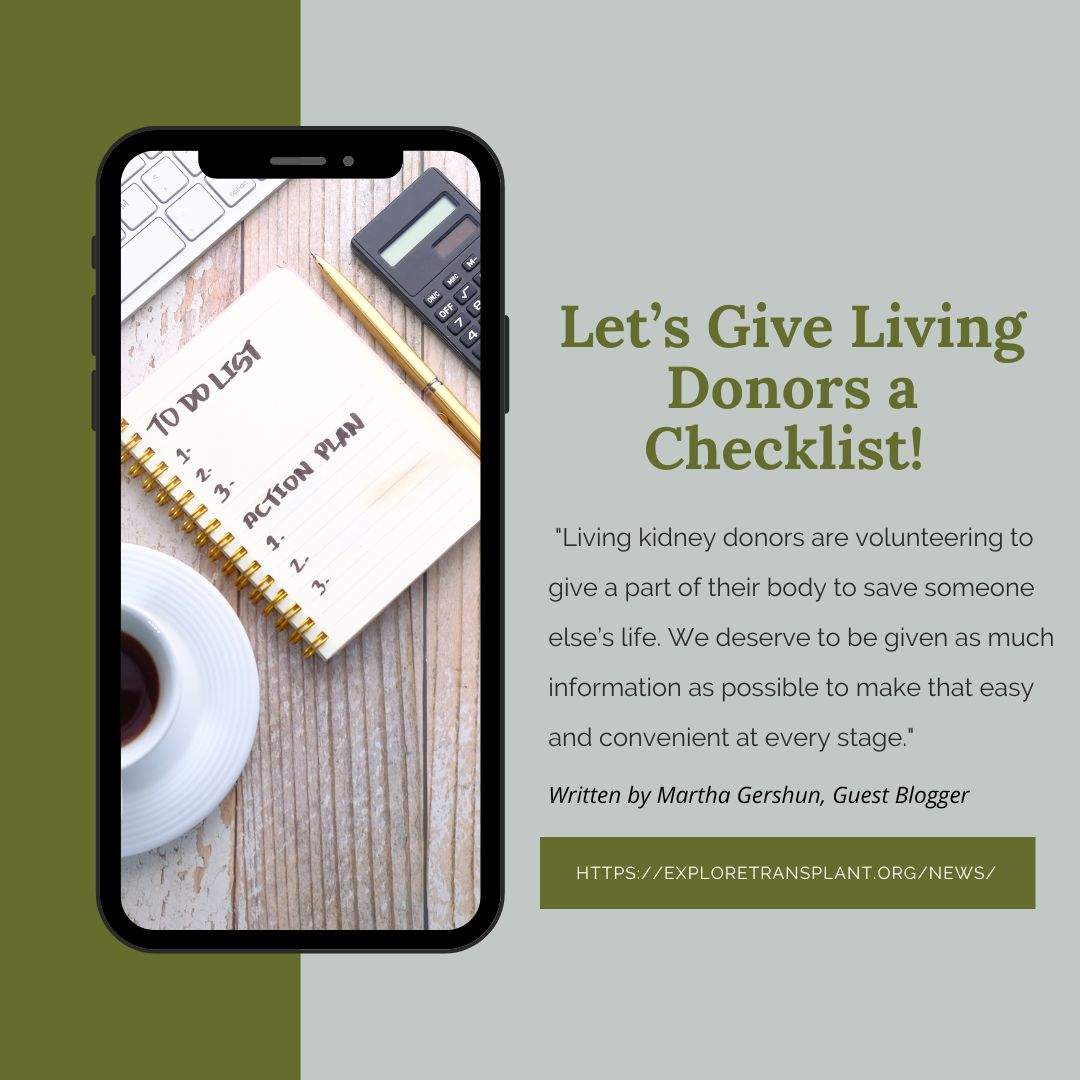Written by Martha Gershun, Guest Blogger
When I first called the transplant center to offer to donate one of my kidneys to a woman I read about in the newspaper, I didn’t know anything about the process. There were a few paragraphs on the center’s website on a page labeled “Living-donor transplantation.” That was it.
When I called the phone number in the newspaper, I assumed I would learn more. But the person who answered the phone was not a doctor, nurse, social worker, or even a volunteer trained to answer questions. She was a busy receptionist, who could only direct me to the website. If I wanted to volunteer, I was instructed to fill out the online Health History Questionnaire. When I completed the survey, an automated response said that if I was a potential match for this kidney patient, someone would call me within five days. If another donor was identified first, I would not be contacted. That was it.
Another donor was not identified for this patient, and, miraculously, I turned out to be an excellent match. I chose to be evaluated to donate. This complicated process took months, for good and important reasons, with priority being given to protecting my health and my psychological wellbeing. I felt safe and well cared for.
But the process was opaque, with seemingly random requests (that felt like demands) popping up with little notice. I never doubted my personal autonomy was being protected in the most fundamental way; I knew I could back out of the donation process at any time. But I never fully understood what was going to happen next, and I felt like I had lost all ability to manage my own calendar.
In one example, I received a call from my nurse coordinator three weeks after my on-site evaluation at the transplant center. She was preparing my file for the Selection Committee for consideration the following week. The file was missing results for my most recent Pap smear, colonoscopy, and mammogram. She asked me to fax them over right away.
I had just spent three days at the transplant center, meeting with nephrologists, surgeons, social workers, nurses, patient educators, phlebotomists, and financial counselors. I had undergone a CT scan of my kidneys, a three-hour kidney function test, several blood draws, a 24-hour urine test, a blood glucose test, an EKG, and a lung x-ray. During any of those appointments, a clinician could have asked me to ensure these test results were forwarded to the clinic. In fact, my nurse coordinator could have asked me to do this when they identified me as a “match” months before.
Instead of telling me what was needed in advance, so I could gather these test results at my convenience, they sprung it on me as a crisis, requiring me to drop everything and rush around, visiting and calling various providers to collect and gather the reports.
This is just one example of the inconveniences thrust upon kidney donors, because we aren’t provided with a detailed roadmap from the start. Rather than being treated like full participants, entitled to know everything that is going to happen, we are relegated to “need to know” status. Information is doled out just in time, at the convenience of the clinic, not the donor.
There is a simple solution. Every transplant clinic could develop a checklist of all the steps that must be completed before a prospective donor can be approved, as well as the steps that must be accomplished before the transplant surgery. Donors could be given that checklist to follow along as the process unfolds. If I had seen this on a checklist, you can bet I would have gotten it done a lot sooner – and at a more convenient time.
- Submit Pap smear results
- Submit colonoscopy results
- Submit mammogram results
Living kidney donors are volunteering to give a part of their body to save someone else’s life. We deserve to be given as much information as possible to make that easy and convenient at every stage.
Martha Gershun is a nonprofit consultant and writer living in Fairway, KS with her husband Don Goldman. Her most recent book, Kidney to Share (Cornell University Press, 2021), with co-author John Lantos, MD, details her experience donating a kidney at the Mayo Clinic to a woman she read about in the newspaper.

